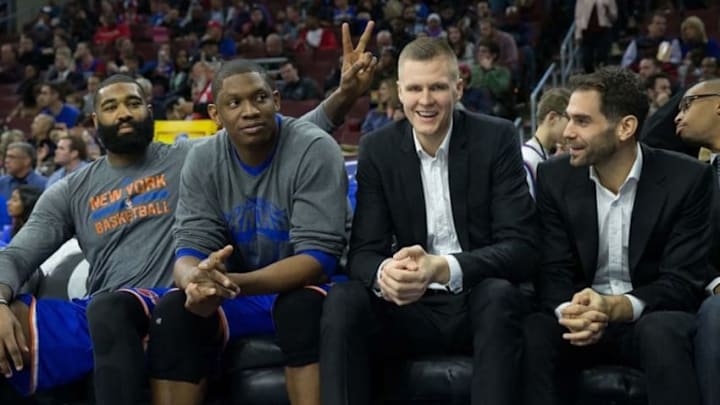Halftime cell phone use has become a point of contention in the NBA. Find out what members of the New York Knicks had to say about it.
One of the most common issues, if you’d call it that, in the NBA is that of halftime cell phone use. It’s exactly what it sounds like; players go into the locker room for halftime, and while there, they check their cell phones.
If that sounds strange to you, then you’re likely on the same page as New York Knicks team president Phil Jackson.
Andrew Keh of The New York Times wrote a brilliant piece highlighting what has become a strange phenomenon in the NBA. In the heat of the battle, a vast number of players on teams across the Association are checking their cell phones for social media updates.
Per Keh, Jackson has told players that he’d prefer if they didn’t use their cell phones at halftime.
"Phil Jackson, the Knicks’ president, told players this season that he preferred they not take their phones out at halftime, Seraphin said. “Phil’s really old school,” Seraphin said. “He doesn’t want players to touch their phones. I mean, you can take your own risk, but he doesn’t really like it.”"
Even the most unforgiving of Jackson bashers can’t help but see his logic, regardless of whether or not they agree.
Halftime isn’t just an intermission for fans to get up and use the restroom; it’s an opportunity for coaches make critical adjustments to the gameplan. Getting through to the players depends quite significantly on their paying attention to what they have to say.
Thus, Jackson’s request is less authoritative and more based in what he perceives as professionalism.
It’s not necessarily unprofessional to be on one’s cell phone. Even if it were, someone from the outside looking in could never accurately make that determination without a steep measure of assumption, which makes criticizing Jackson’s stance tough to do.
Knicks veteran Jose Calderon is on the same page as Jackson, as he can’t seem to fathom why players would even consider going on their cell phone at halftime.
"“Oh, no, not halftime,” he said. “Well, I don’t. You’re thinking about the game.”"
Ideally, yes; you are.
Yet, despite the veterans’ agreement —add Richard Jefferson, Dikembe Mutombo, Doc Rivers, Brian Shaw, and Reggie Theus to the list—that cell phone use is still prominent. Interestingly, the two teams singled out by Keh as those who admit to doing it—the Chicago Bulls and the Knicks—both missed the playoffs.
Shaw once banned cell phone use in the locker room because he felt his Denver Nuggets team—one that went 30-52 in 2014-15—lacked focus.
Not everyone is against cell phone use in the locker room. Not surprisingly, those who spoke in favor of it are of a younger generation who fall in the crosshairs of social media obsession.
Knicks big man Kevin Seraphin, who played an average of 11.0 minutes per game in 2015-16, admitted to being one of the players who remains active on his cell phone during games.
"The Knicks’ Kevin Seraphin, 26, said friends asked him to turn off his phone at restaurants because he could not control himself otherwise. He maintains active accounts on Instagram, Snapchat, Twitter and Periscope and likes interacting online with fans. He said he was even developing his own social media app.“I’m not perfect,” Seraphin said. “I love social networks.”"
That transpires throughout the world, not just in the NBA.
Cell phone use in the locker room is likely to become an even bigger topic of conversation in future seasons. As the older players face retirement, and the new generation takes over, coaches will have to adjust to life with the millennials.
Only time will tell how those of two different mentalities gel.
For the veterans who are still present, seeing players on their cell phone at halftime is something they’re struggling to understand. That includes Knicks reserve Lou Amundson was shocked to see how prominent cell phone use has become in today’s society.
That isn’t just limited to the players; even the ball boys are doing it.
"At a recent game, he was dismayed to see the ball boys looking at their phones between rebounds and passes.“You’re on the court at the Garden!” he said, recalling the scene. “Be in the moment, man.”“It takes us as a society someplace I don’t think we need to be going,” Amundson said. “I really feel strongly that there’s going to be some kind of countercultural revolution where people start to reject this idea that you need to be connected and you need to have access to everything and you need a phone in front of your face the whole day.”"
For what it’s worth, Amundson studied philosophy at UNLV.
This isn’t exactly a season-defining development in New York, but it’s a very interesting topic. Keh’s full article is worth the read, and this issue should be discussed and explored on a broad stage.
Jackson is aiming to save the Knicks from the cell phone revolution while games are in action—and yes, that includes halftime.
More knicks: Which free agent shooting guards should the New York Knicks pursue?
I suppose social media will inform us as to whether or not his efforts are rewarded.
